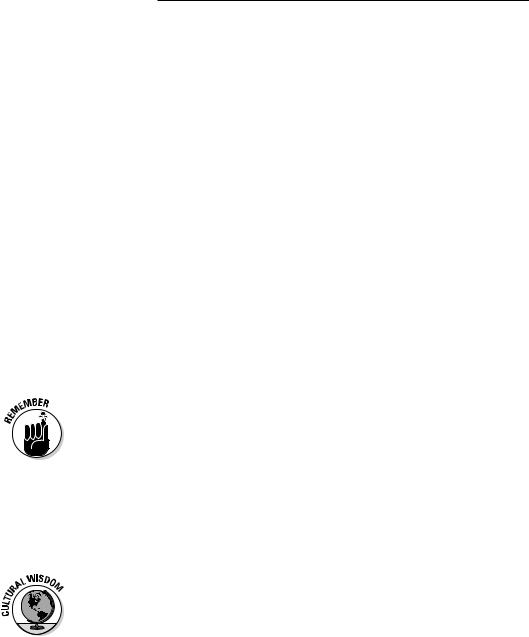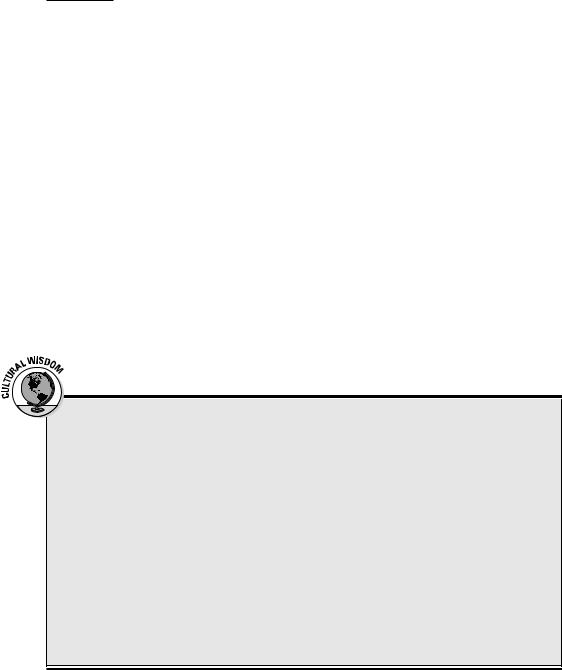
- •About the Authors
- •Dedication
- •Acknowledgments
- •Table of Contents
- •Introduction
- •About This Book
- •Conventions Used in This Book
- •Foolish Assumptions
- •How This Book Is Organized
- •Icons Used in This Book
- •Where to Go from Here
- •The French You’re Familiar With
- •Idioms and Popular Expressions
- •Key Parts of Speech
- •Cavorting with Verbs
- •Forming Sentences and Questions
- •The French Alphabet
- •Uttering Vowel and Consonant Sounds
- •Greetings: Formal and Friendly
- •Asking Questions to Get to Know People
- •Counting Your Lucky Stars: Numbers
- •Using the Calendar and Dates
- •Telling Time in French
- •Discussing Where You Live with the Verb “Habiter”
- •Discussing Daily Routine with Reflexive Verbs
- •Using Possessive Adjectives to Introduce Your Family Members
- •Basic Questions and Polite Expressions
- •Stating Your Preferences
- •Talking about Your Livelihood
- •Chatting about the Weather
- •Deciding to Keep in Touch
- •Getting Direction about Directions
- •Dining Out
- •Going to the Market
- •Going Shopping
- •Going Out with the Verb “Sortir”
- •Having Fun with the Verb “S’amuser”
- •Oh, the Places You’ll Go!
- •Making Plans with Friends
- •Making a Phone Call
- •Livin’ in the Past: Using the Past Tense
- •Playing Sports and Games
- •Going to the Beach
- •Setting Up Camp
- •Enjoying Quieter Pursuits
- •Where Do You Want to Go?
- •Getting Ready for Your Trip
- •Getting Current with Currency
- •Going to the Bank
- •Using Credit Cards and ATMs
- •Getting through the Airport
- •Navigating Buses, Trains, and Subways
- •Getting Around by Car
- •Finding Accommodations
- •Checking In to a Hotel
- •Checking Out of a Hotel
- •Getting Help Fast
- •Getting Medical Help
- •Handling Legal Matters
- •Label the Things in Your House
- •Write Your Shopping Lists in French
- •Listen to French Music
- •Watch French Movies
- •Tune in to TV5
- •Read French Publications
- •Take a Class
- •Join a French Association
- •Join an Online Chat or Pen Pal Forum
- •Using “Tu” When You Mean “Vous”
- •Using “Bonne nuit!” for Good-Bye
- •Using “Garçon” or “Porteur” to Address Service Staff
- •Saying “Je suis excité(e)” to Indicate Excitement
- •Saying “Je suis chaud(e)/froid(e)” to Say You’re Hot or Cold
- •Saying “Je suis plein/e” to Mean You’re Full
- •Using “de la glace” to Request Ice
- •Using “Je suis . . . ans” to Tell Your Age
- •Asking for Change with “J’ai besoin de change”
- •Using the Verb “Visiter” in Reference to People
- •“À mon avis”
- •“C’est pas vrai”
- •“Avec plaisir”
- •“C’est génial”
- •“À votre santé”
- •“À vos souhaits”
- •“Quelle horreur!”
- •“À bientôt”
- •“Passez-moi un coup de fil!”
- •“On y va!” or “Allons-y!”
- •“Je n’en sais rien”
- •“Je n’en reviens pas”
- •“Ça vaut la peine”
- •“C’est pas grave”
- •“N’importe”
- •“Tu cherches midi à 14h”
- •“Prenons un pot!”
- •Regular French Verbs
- •Auxiliary French Verbs
- •Track Listing
- •Customer Care
- •Index

44 |
Part I: Getting Started |
Greetings: Formal and Friendly
Greetings are the first steps in establishing contact with someone, whatever the language. In many cases, a smile does the job, and you just have to wait for the other person to greet you and repeat what he or she just said. However, this section presents plenty of very simple French greetings that you may use on different occasions to help you meet people.
Addressing someone formally or informally
In French, you can vary the level of formality in your speech by how you say the word you. Depending on whom you are addressing, you can use the informal tu (tew) or the more formal vous (vooh). It’s important to know when one or the other is appropriate because if you say the wrong thing, at best, you sound a little funny; at worst, you offend someone.
In general, use the formal vous when you address somebody you have never met, a superior, or an older person. As you get to know that person better, you may both switch to tu. Use the less formal tu when you speak to a friend, a child, or an animal. In addition, members of the same family, whatever their age, use the tu form.
The environment in which you find yourself also determines the correct form of address. For example, if you’re a young person traveling on the train in France and you meet other young people, you would address one another as tu. On the other hand, if you’re in a store, you’d address the clerk with vous, even if she looks a lot younger than you. Also keep in mind that the vous form is used to address one person on a formal level, but it is also a plural form used to address any number of people formally or informally.
If you are not sure what to do, use the vous form until the person you are addressing asks you to use the tu form. Then you avoid any faux pas (foh pah) (social blunder [literally, false step]).
In French, in a formal situation, it is more polite to add monsieur (muhsyuh) (mister, sir) to address a man, madame (mah-dahm) (ma’am, missus) to address a married woman, and mademoiselle (mahd-mwah-zehl) (miss) to address an unmarried woman, after even the simplest of expressions like bonjour (bohN-zhoohr) (good day, hello) and merci (mehr-see) (thank you). (The English Ms. has no equivalent in French.) If you don’t know whether a
woman is married or not, to be on the safe side, use madame. Remember also that monsieur, madame, and mademoiselle can be used on their own and are, most of the time.
www.ATIBOOK.ir

Chapter 3: Getting Started with Pronunciation and Basic Expressions |
45 |
Saying hello and good-bye
Nothing is easier than saying hello in a foreign language. Actually, the French language has a saying, when referring to something that is really a cinch: C’est simple comme bonjour (seh saN-pluh kohm bohN-zhoohr) (It’s as easy as saying hello). So go ahead and practice these greetings and farewells:
Bonjour! (bohN-zhoohr!) literally means Good day!, but you can use it when first greeting someone in the morning or afternoon, as long as the sun is shining.
In Québec, people also say Bonjour when leaving, giving it the true meaning of good day.
Bonsoir! (bohN-swahr!) (Good evening!).You use this greeting in the late afternoon and the evening to say hello or good-bye.
Salut! (sah-lew!) (Hi! Bye!). This is the most informal of all hellos and is also a way of saying good-bye. Although you can use it at any time of day, you can’t use it with just anybody. Use this word only with children and people you’re familiar with.
Au revoir! (ohr-vwahr!) (Good-bye!). Like its English counterpart, you can use this term any time of day or night.
Bonne nuit! (bohhn nwee!) (Good night!). Say this only when you’re retiring for the night or when you’re putting a child to bed. It essentially means sleep well.
A bientôt! (ah byaN-toh!) (See you soon!). Say this when you expect to see the person again in the near future.
A tout à l’heure! (ah tooh-tah luhr!) (See you later!). Use this phrase only when you’ll see the person the same day.
A demain! (ah duh-maN!) (See you tomorrow!)
Bonne journée! (bohhn zhoohr-ney!) (Have a nice day!)
Introducing yourself and others
It is not enough to greet people and ask how they are; you also need to introduce yourself and find out what their names are. The purpose of this section is to help you do just that.
In French, when you want to say My name is. . ., you use a reflexive form of the verb appeler (ahp-ley) (to call). Thus, je m’appelle (zhuh mah-pehl) literally means I call myself. The following table shows all the forms of appeler in the present tense. (Refer to Chapter 2 for general information on French verbs.)
www.ATIBOOK.ir

46 |
Part I: Getting Started |
|
|
|
|
||
|
Conjugation |
Pronunciation |
|
|
je m’appelle |
zhuh mah-pehl |
|
|
tu t’appelles |
tew tah-pehl |
|
|
il/elle/on s’appelle |
eel/ehl/ohN sah-pehl |
|
|
nous nous appelons |
nooh nooh-zah-plohN |
|
|
vous vous appelez |
vooh vooh-zah-pley |
|
|
ils/elles s’appellent |
eel/ehl sah-pehl |
|
You may use either of these phrases:
Je m’appelle . . . . (zhuh mah-pehl. . . .) (My name is . . . .)
Je suis . . . . (zhuh swee. . . .) (I am . . . .)
If you want to know who that person over there is, you ask Qui est-ce? (kee ehs?) (Who is that?). And you receive the answer C’est . . . (seh. . .) (That is . . . ). To introduce someone, you say any of the following:
Je vous présente . . . . (zhuh vooh prey-zahNt. . . .) (Let me introduce . . .
to you.) (formal)
Je te présente . . . . (zhuh tuh prey-zahNt. . . .) (Let me introduce . . .
to you.) (informal)
Voici . . . ./Voilà . . . . (vwah-see. . . ./vwah-lah. . . .) (Here is . . . ./There is . . . .)
After you introduce yourself or someone else, the other person, if a man, typically says Enchanté! (ahN-shahN-tey!) or, if a woman, Enchantée! (pronounced the same). In either case, the meaning is the same: Delighted! Of course, on the playground or at a gathering of young people, you may hear these expressions instead:
Comment tu t’appelles?/Comment t’appelles-tu? (koh-mahN tew-tah- pehl?/koh-mahN tah-pehl-tew?) (What’s your name?)
Et lui, qui est-ce? (ey lwee kee ehs?) (And who is he?), or Et elle, qui est-ce? (ey ehl kee ehs?) (And who is she?)
Talkin’ the Talk
Marc Sauval and his wife Christine, entrepreneurs from Québec, are meeting their French counterpart, Claire Rivet for the first time. (Track 2)
www.ATIBOOK.ir

Chapter 3: Getting Started with Pronunciation and Basic Expressions |
47 |
Marc: Bonjour, madame. Je m’appelle Marc Sauval. bohN-zhoohr, mah-dahm. zhuh mah-pehl mahrk soh-vahl.
Hello, ma’am. My name is Marc Sauval.
Claire: Ah, monsieur Sauval. Je suis Claire Rivet. Enchantée! ah, muh-syuh soh-vahl. zhuh swee klehr ree-vey. ahN-shahN-tey.
Ah, Mr. Sauval. I am Claire Rivet. Delighted to meet you!
Marc: Madame Rivet, je vous présente ma femme,
Christine.
mah-dahm ree-vey, zhuh vooh prey-zahNt mah fahm, krees-teen.
Mrs Rivet, let me introduce you to my wife, Christine.
Claire: Enchantée, madame! ahN-shahN-tey, mah-dahm!
Delighted, ma’am!
Christine: Enchantée!
ahN-shahN-tey
Delighted!
Asking Questions to Get to Know People
One of the ways to get information is by asking questions. You may want to ask, for example, whether the bistro around the corner is good, whether the banks are open on Mondays, or whether the train is running on schedule.
And what about asking how someone is? Well, you can ask all these questions simply by following the guidelines explained in the following sections.
Informal and formal ways to ask questions
You can form a yes or no question in French in four ways. The first three are very informal, and the last is more formal.
Using intonation
To ask a question using intonation, simply raise your voice at the end of a statement: Vous parlez français? (vooh parh-ley frahN-seh?) (Do you speak French?)
www.ATIBOOK.ir

48 |
Part I: Getting Started |
Using “n’est-ce pas”
One way to form a question is to add n’est-ce pas (nehs pah) to the end of the sentence. This expression takes on the translation of whatever the question is. It could mean isn’t it, don’t you, doesn’t she, and so on.) This type of question anticipates a yes answer: Vous parlez français, n’est-ce pas? (vooh parh-ley frahN-seh, nehs pah?) (You speak French, don’t you?)
Using “est-ce que”
You can form a question by adding est-ce que (ehs-kuh) to the front of the statement. The statement Paris est une grande ville (pah-ree eht-ewn grahNd veel) (Paris is a big city) becomes Est-ce que Paris est une grande
ville? (ehs-kuh pah-ree eht-ewn grahNd veel?) (Is Paris a big city?). Note that the final e in Est-ce que is dropped when it comes before a vowel: Est-ce qu’il parle français? (ehs-keel parhl frahN-seh?) (Does he speak French?)
Using inversion
In this method, you switch the places of the verb and the subject pronoun and add a hyphen between them. Consider these examples:
Vous parlez français (vooh parh-ley frahN-seh) (You speak French) becomes Parlez-vous français? (parh-ley vooh frahN-seh?) (Do you speak French?)
Tu aimes la musique (tew ehm lah mew-zeek) (You like music) becomes Aimes-tu la musique? (ehm-tew lah mew-zeek?) (Do you like music?)
To use inversion correctly, when the verb ends in a vowel and the subject pronoun begins with a vowel — mainly il (eel) (he, it), elle (ehl) (she, it), on (ohN) (one) — you add the letter t in between them and place hyphens on both sides: Il parle français (eel parhl frahN-seh (He speaks French) becomes Parle-t-il français? (parhl-teel frahN-seh?) (Does he speak French?)
Asking and replying to “How are you?”
Most of the time, when you meet someone, especially someone you already know, your greeting is followed by the question “How are you?” French has several different ways of asking the question, depending on the level of formality between the two speakers:
Formal: Comment allez-vous? (koh-mahN-tah-ley-vooh?) (How are you?) and Vous allez bien? (vooh-zah-ley byaN?) (Are you well?)
Informal: Comment vas-tu? (koh-mahN vah-tew?) (How are you?), Comment ça va? (koh-mahN sah vah?) (How is it going?), and Ça va?
(sah vah?) (Is it going?, meaning Are you okay?).
Of course, others may well want to know how you are. In those cases, they naturally expect you to reply, albeit without going into lengthy details about
www.ATIBOOK.ir

Chapter 3: Getting Started with Pronunciation and Basic Expressions |
49 |
your health, your work, or your private life. A short phrase will do, such as the following:
Ça va! (sah vah!) (I’m okay!)
Ça va bien!/Ça va très bien! (sah vah byaN!/sah vah treh byaN!) (I’m fine!/I’m very well!)
Bien, merci!/Très bien, merci! (byaN, mehr-see!/treh byaN, mehr-see!) (Fine, thank you!/Very well, thank you!)
Je vais bien, merci. (zhuh veh byaN, mehr-see.) (I am well, thank you.) This is a more formal response.
Pas mal! (pah mahl!) (Not bad!)
Of course, you can also answer negatively. You can say, for example, Je ne vais pas très bien aujourd’hui (zhuhn veh pah treh byaN oh-zhoohr-dwee) (I am not very well today).
The negative in French has two parts: ne (nuh) which you place in front of the conjugated verb and pas (pah) (not), which you place after the conjugated verb. If the verb begins with a vowel or a mute h, then you drop the e from ne and you add an apostrophe: n’. For example, Il n’est pas fatigué (eel neh pah fah-tee-gey) (He is not tired).
Whenever you answer a “How are you?” question, you probably want to follow it up with an inquiry about the well-being of the other person. To do so, you simply follow your answer with either the formal Et vous? (ey vooh?) or the informal Et toi? (ey twah?). Both mean And you?
Revisiting the verb “aller”
Aller (ah-ley) (to go) is a very useful and multifunctional verb in French. As Chapter 2 explains, aller is an irregular verb, which means that the stem is different throughout its conjugation:
Conjugation |
Pronunciation |
je vais |
zhuh veh |
tu vas |
tew vah |
Il/elle/on va |
eel/ehl/ohN vah |
nous allons |
nooh-zah-lohN |
vous allez |
vooh-zah-ley |
ils/elles vont |
eel/ehl vohN |
www.ATIBOOK.ir

50 |
Part I: Getting Started |
You use the verb aller when you want to say you’re going to the store or to the movies, but you also use this verb when you want to talk about how you or someone else is, which makes it a vital verb when you’re making introductions and want to ask How are you? in French. To do so, you use the interrogative adverb comment (koh-mahN) (how) in the following ways:
Comment est-ce que vous allez?/Comment est-ce que tu vas? (koh-mahN ehs-kuh vooh-zah-ley?/koh-mahN ehs-kuh tew vah?) (How are you?)
Comment allez-vous?/Comment vas-tu? (koh-mahN-tah-ley-vooh?/koh- mahN vah-tew?) (How are you?) — This construction is more common.
Talkin’ the Talk
Madame Leblanc is doing her daily food shopping and goes into
Monsieur Martin’s butcher shop.
M. Martin: Bonjour, Madame Leblanc. Comment allez-vous? bohN-zhoor, mah-dahm luh-blahN koh-mahN-tah- ley-vooh?
Hello, Mrs Leblanc. How are you?
Mme. Leblanc: Très bien, merci, et vous? treh byaN, mehr-see, ey vooh?
Very well, thank you, and you?
M. Martin: Ça va bien, merci.
sah vah byaN, mehr-see.
I’m fine, thank you.
Later, after Madame Leblanc has made her purchases, she prepares to leave the store.
M. Martin: Au revoir, Madame Leblanc. Bonne journée. ohr-vwahr, mah-dahm luh-blahN. bohhn zhoohr-ney.
Good-bye, Mrs Leblanc. Have a nice day.
Mme. Leblanc: Au revoir, monsieur. ohr-vwahr, muh-syuh.
Good-bye, sir.
www.ATIBOOK.ir

Chapter 3: Getting Started with Pronunciation and Basic Expressions |
51 |
As Madame Leblanc leaves the shop, she overhears two teenagers who have just met on the street.
Girl: |
Salut, Michel. Comment ça va? |
|
sah-lew, mee-shehl. koh-mahN sah vah? |
|
Hi, Michel. How are you doing? |
Boy: |
Pas mal. Et toi? |
|
pah mahl. ey twah? |
|
Not too bad, How about you? |
Girl: |
Oh, ça va. Et lui, qui est-ce? |
|
oh, sah vah. ey lwee, kee ehs? |
|
Oh, I’m okay. And who is he? |
Boy: |
C’est mon frère. Il s’appelle Thomas. |
|
seh mohN frehr. eel sah-pehl toh-mah. |
|
He’s my brother. His name is Thomas. |
Girl: |
Salut, Thomas! |
|
sah-lew, toh-mah! |
|
Hi, Thomas! |
|
|
Friendly greetings
The French touch a lot more than the AngloSaxons do in greeting others. The handshake is not restricted to the first meeting between two persons, for example. Instead, most people in an office shake hands every morning when they get to work and every evening when they leave the office. On a more informal level, women friends kiss lightly on each cheek when they greet each other or say good-bye. A man and a woman meeting or saying good-bye do the same. Male family members may kiss one another, too. If you travel to different parts of France, you may be surprised to discover that in some areas people kiss not twice but three
times, and sometimes up to four times! You even see a large amount of cheek-pecking between high school students arriving at school in the morning!
Say you’re invited to a dinner party by a French family with children and the parents introduce their children to you before they are sent to bed. They may tell the children Dites bonsoir à tout le monde (deet bohN-swahr ah tooh luh mohNd) (Say good evening to everyone).
Immediately, the little ones might go around the dinner table giving a kiss to all the guests and expecting a kiss back.
www.ATIBOOK.ir

52 |
Part I: Getting Started |
Fun & Games |
Here is a list of words that got loose. See whether you can put them back where they belong in the dialog below.
elle |
je |
m’appelle |
l’anglais |
grande |
femme |
Bonjour, je (1)________________ Pierre Lanvin. (2)________________ suis de Marseille. C’est une (3)________________ ville française. Ma (4)________________
s’appelle Monique et (5)________________ est canadienne. Je parle le français, bien sûr et aussi un peu (6)________________.
Now fill in the missing words in this dialog between an elderly woman and a teenage boy with a teenage girl.
voici |
bien |
ça va |
parles |
toi |
Bonjour, madame Legrand. Comment (7)________________?
Ça va bien, merci Denis. Et (8)________________, comment vas-tu?
Ça va, merci. Madame Legrand, (9)________________ Lucy. Elle vient des Etats-Unis.
Oh, bonjour Lucy. Alors tu (10)________________ français?
Pas très (11)________________, madame
www.ATIBOOK.ir
